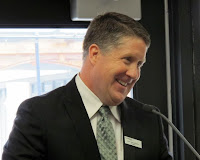This week, the Diplomatic Hospitality Group of CFUW-Ottawa (of which I'm a member) invited diplomats' families to tour Algonquin College, and because of its international reputation, the event was very well attended. We met in one of the salons for refreshments provided by the college and to hear an introduction by the President, Dr. Kent MacDonald. Students no longer use textbooks, he told us. That information was reinforced when I visited the campus "bookshop," afterwards, and found it almost devoid of books! The students are encouraged to take their "iPhones and laptops" into class, instead––in fact, this is compulsory.
In order to give the students and alumni a sense of achievement and to generate income, each department is run as a business. This is perhaps most obvious in the school of culinary arts where the students' practical work is on sale to the general public. There's a delicatessen and restaurant on site, well worth a visit, and catering skills are taught and practised as well. Hence the college can afford their well equipped wine tasting facilities and state-of-the-art kitchens. At the Restaurant International, staffed by students on the Hospitality program, a posh four course meal, elegantly served, can be enjoyed for $25.
 As an indication of the institution's financial success, new buildings have sprung up like mushrooms around the campus. Near the bus stops, the futuristic, $70 million Algonquin Centre for Construction Excellence, opened in 2011, incorporates a "living wall" of tropical plants in its atrium, managed by the engineering and horticulture students. On my tour, I saw the Cabinet making facilities in this building, with girls learning there as well as young men. They also have a fully equipped school of carpentry with apprentices making roof beams on site, in the comfort of an indoor environment.
As an indication of the institution's financial success, new buildings have sprung up like mushrooms around the campus. Near the bus stops, the futuristic, $70 million Algonquin Centre for Construction Excellence, opened in 2011, incorporates a "living wall" of tropical plants in its atrium, managed by the engineering and horticulture students. On my tour, I saw the Cabinet making facilities in this building, with girls learning there as well as young men. They also have a fully equipped school of carpentry with apprentices making roof beams on site, in the comfort of an indoor environment. The schools of Advanced Technology and of Electrico-mechanical Engineering seem to have very sophisticated facilities. Mechanical technicians in the tool making workshop were referring to data on computer screens as they used their lathes. The School of Media and Design was another stop on our campus tour. Horticultural Industries comes under this heading, as does Professional Writing. We caught a glimpse of a Theatre Arts workshop in action and walked through another room full of students who were creating animated films and video games in preparation for their end of term exams. In this wing, a live radio station broadcasts daily, manned by the students, giving them practical experience as well as providing publicity for local musicians; likewise a campus newspaper is put together by the School of Journalism for the sake of the students' portfolios.
The schools of Advanced Technology and of Electrico-mechanical Engineering seem to have very sophisticated facilities. Mechanical technicians in the tool making workshop were referring to data on computer screens as they used their lathes. The School of Media and Design was another stop on our campus tour. Horticultural Industries comes under this heading, as does Professional Writing. We caught a glimpse of a Theatre Arts workshop in action and walked through another room full of students who were creating animated films and video games in preparation for their end of term exams. In this wing, a live radio station broadcasts daily, manned by the students, giving them practical experience as well as providing publicity for local musicians; likewise a campus newspaper is put together by the School of Journalism for the sake of the students' portfolios. Probably the most impressive part of our tour was our visit to the Health and Community Studies facility. Here, they train nurses in fully equipped pseudo wards and surgery theatres, using expensive and lifelike (or should I say deathlike?) "mannequins" to practise on, whose fingers have a rubbery feel. Apparently the mannequins have a (programmable) pulse and really bleed. One of them is capable of giving birth every five minutes and the newborn baby's very realistic, too. Virtual reality, as in flight simulators! The nursing students can be monitored by their supervisors from behind a one-way mirror. For the Dental Hygiene diploma, during a 3 year course, aspirant dental hygienists are trained in a proper clinic, open to the public who can volunteer to be guinea pigs, with row upon row of fully equipped dentist's chairs at their disposal.
Probably the most impressive part of our tour was our visit to the Health and Community Studies facility. Here, they train nurses in fully equipped pseudo wards and surgery theatres, using expensive and lifelike (or should I say deathlike?) "mannequins" to practise on, whose fingers have a rubbery feel. Apparently the mannequins have a (programmable) pulse and really bleed. One of them is capable of giving birth every five minutes and the newborn baby's very realistic, too. Virtual reality, as in flight simulators! The nursing students can be monitored by their supervisors from behind a one-way mirror. For the Dental Hygiene diploma, during a 3 year course, aspirant dental hygienists are trained in a proper clinic, open to the public who can volunteer to be guinea pigs, with row upon row of fully equipped dentist's chairs at their disposal.




No comments:
Post a Comment